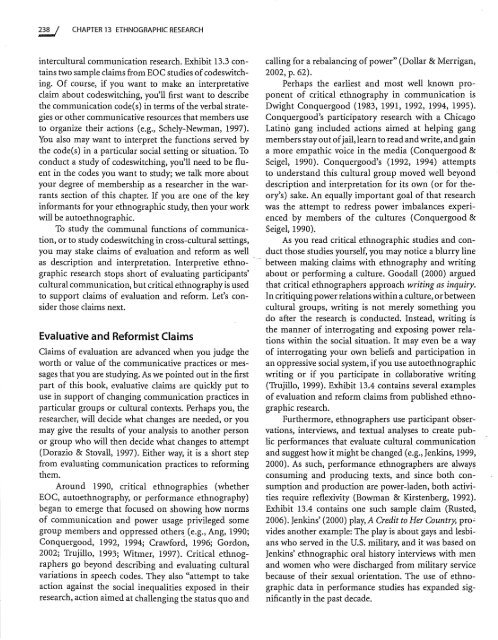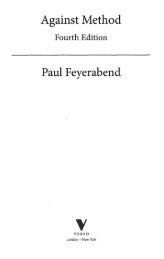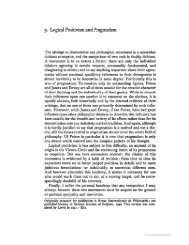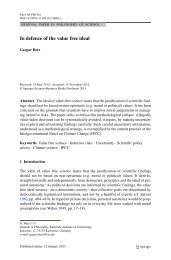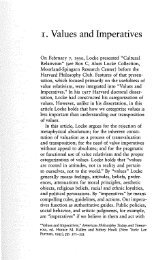Ethnographic Research - Matthew J. Brown
Ethnographic Research - Matthew J. Brown
Ethnographic Research - Matthew J. Brown
- No tags were found...
You also want an ePaper? Increase the reach of your titles
YUMPU automatically turns print PDFs into web optimized ePapers that Google loves.
~ CHAPTER 13 ETHNOGRAPHIC RESEARCHintercultural communication research. Exhibit 13.3 containstwo sample claims from EOC studies of codeswitching.Of course, if you want to make an interpretativeclaim about codeswitching, you'll first want to describethe communication code(s) in terms of the verbal strategiesor other communicative resources that members useto organize their actions (e.g., Schely-Newman, 1997).You also may want to interpret the functions served bythe code(s) in a particular social setting or situation. Toconduct a study of codeswitching, you'll need to be fluentin the codes you want to study; we talk more aboutyour degree of membership as a researcher in the warrantssection of this chapter. If you are one of the keyinformants for your ethnographic study, then your workwill be autoethnographic.To study the communal functions of communication,or to study codeswitching in cross-cultural settings,you may stake claims of evaluation and reform as wellas description and interpretation. Interpretive ethno- .graphic research stops short of evaluating participants'cultural communication, but critical ethnography is usedto support claims of evaluation and reform. Let's considerthose claims next.Evaluative and Reformist ClaimsClaims of evaluation are advanced when you judge theworth or value of the communicative practices or messagesthat you are studying. As we pointed out in the firstpart of this book, evaluative claims are quickly put touse in support of changing communication practices inparticular groups or cultural contexts. Perhaps you, theresearcher, will decide what changes are needed, or youmay give the results of your analysis to another personor group who will then decide what changes to attempt(Dorazio & Stovall, 1997). Either way, it is a short stepfrom evaluating communication practices to reformingthem.Around 1990, critical ethnographies (whetherEOC, auto ethnography, or performance ethnography)began to emerge that focused on showing how normsof communication and power usage privileged somegroup members and oppressed others (e.g., Ang, 1990;Conquergood, 1992, 1994; Crawford, 1996; Gordon,2002; Trujillo, 1993; Witmer, 1997). Critical ethnographersgo beyond describing and evaluating culturalvariations in speech codes. They also "attempt to takeaction against the social inequalities exposed in theirresearch, action aimed at challenging the status quo andcalling for a rebalancing of power" (Dollar & Merrigan,2002, p. 62).Perhaps the earliest and most well known proponentof critical ethnography in communication isDwight Conquergood (1983, 1991, 1992, 1994, 1995).Conquergood's participatory research with a ChicagoLatino gang included actions aimed at helping gangmembers stay out of jail, learn to read and write, and gaina more empathic voice in the media (Conquergood &Seigel, 1990). Conquergood's (1992, 1994) attemptsto understand this cultural group moved well beyonddescription and interpretation for its own (or for theory's)sake. An equally important goal of that researchwas the attempt to redress power imbalances experiencedby members of the cultures (Conquergood &Seigel, 1990).As you read critical ethnographic studies and conductthose studies yourself, you may notice a blurry linebetween making claims with ethnography and writingabout or performing a culture. Goodall (2000) arguedthat critical ethnographers approach writing as inquiry.In critiquing power relations within a culture, or betweencultural groups, writing is not merely something youdo after the research is conducted. Instead, writing isthe manner of interrogating and exposing power relationswithin the social situation. It may even be a wayof interrogating your own beliefs and participation inan oppressive social system, if you use autoethnographicwriting or if you participate in collaborative writing(Trujillo, 1999). Exhibit 13.4 contains several examplesof evaluation and reform claims from published ethnographicresearch.Furthermore, ethnographers use participant observations,interviews, and textual analyses to create publicperformances that evaluate cultural communicationand suggest how it might be changed (e.g., Jenkins, 1999,2000). As such, performance ethnographers are alwaysconsuming and producing texts, and since both consumptionand production are power-laden, both activitiesrequire reflexivity (Bowman & Kirstenberg, 1992).Exhibit 13.4 contains one such sample claim (Rusted,2006). Jenkins' (2000) play,A Credit to Her Country, pro~vides another example: The play is about gays and lesbianswho served in the U.S. military, and it was based onJenkins' ethnographic oral history interviews with menand women who were discharged from military servicebecause of their sexual orientation. The use of ethnographicdata in performance studies has expanded significantlyin the past decade.


